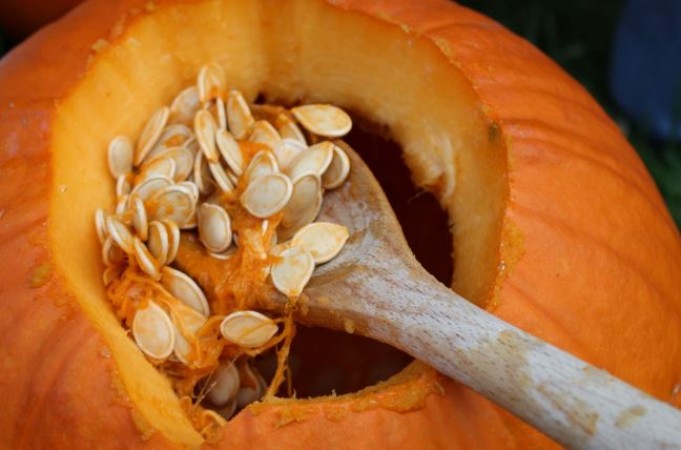
Pumpkin seeds, often overlooked and discarded, are actually a powerhouse of nutrition and offer a range of health benefits. Rich in essential nutrients, pumpkin seeds can play a significant role in protecting against various serious diseases. Here’s a detailed guide on how incorporating pumpkin seeds into your diet can benefit your health and the best ways to consume them.
Health Benefits of Pumpkin Seeds
Managing Diabetes
Pumpkin seeds are beneficial for managing diabetes. They are rich in magnesium, which helps regulate blood sugar levels. Magnesium plays a crucial role in insulin action and glucose metabolism, making it a vital mineral for individuals with diabetes or those at risk.
Reducing Cancer Risk
The antioxidants present in pumpkin seeds, such as vitamin E and beta-carotene, help neutralize free radicals in the body. Free radicals are unstable molecules that can cause cellular damage and increase cancer risk. Regular consumption of pumpkin seeds may lower the risk of certain types of cancer, including prostate and breast cancer.
Supporting Weight Loss
High in fiber and protein, pumpkin seeds can aid in weight management. Fiber helps keep you feeling full longer, reducing the likelihood of overeating. Additionally, protein supports muscle health and metabolism, both of which are important for effective weight management.
Improving Gut Health
Pumpkin seeds are an excellent source of dietary fiber, which promotes a healthy digestive system. Fiber adds bulk to the stool, preventing constipation and supporting overall gut health. Consuming pumpkin seeds regularly can help maintain a balanced and healthy digestive tract.
Controlling Blood Pressure and Cholesterol
The omega-6 fatty acids found in pumpkin seeds can help manage blood pressure levels and improve heart health. Magnesium also supports healthy blood vessel function, which contributes to lowering blood pressure. Moreover, pumpkin seeds may help balance cholesterol levels, further protecting cardiovascular health.
How to Incorporate Pumpkin Seeds into Your Diet
As a Snack
Pumpkin seeds can be enjoyed on their own as a nutritious snack. Simply roast them lightly with a pinch of salt or your favorite spices for added flavor. This makes for a crunchy and satisfying snack that’s also beneficial for your health.
In Smoothies
Add a handful of pumpkin seeds to your morning smoothie. They blend well with fruits and vegetables and provide a nutrient boost. They add texture and enhance the nutritional profile of your smoothie with additional protein, fiber, and healthy fats.
In Breakfast Dishes
Incorporate pumpkin seeds into your breakfast for added health benefits. Sprinkle them over yogurt, oatmeal, or cereal. This not only enhances the flavor but also increases the nutritional value of your morning meal.
In Baking
Add pumpkin seeds to baked goods like muffins, bread, or granola bars. They add a pleasant crunch and an extra dose of nutrients. Pumpkin seeds can also be included in homemade energy bars for a quick and nutritious snack option.
In Salads
Toss pumpkin seeds into your salads for added texture and nutrition. They pair well with leafy greens and vegetables, enhancing both the flavor and the health benefits of your salad.
Nutritional Profile of Pumpkin Seeds
Pumpkin seeds are packed with essential nutrients, including:
Omega-6 Fatty Acids: These healthy fats support cardiovascular health and regulate inflammation.
Magnesium: Important for muscle and nerve function, as well as maintaining healthy blood sugar levels.
Zinc: Supports the immune system, wound healing, and cellular function.
Fiber: Aids in digestion and helps maintain healthy bowel movements.
Antioxidants: Such as vitamin E and beta-carotene, which protect cells from oxidative stress.
Vitamin E: Supports skin health and provides antioxidant protection.
Recommended Intake
To reap the health benefits of pumpkin seeds, it is recommended to consume them in moderation. A typical serving size is about a quarter cup of raw or roasted seeds per day. Incorporating pumpkin seeds into a balanced diet, along with other nutrient-rich foods, will help you maintain overall health and well-being.
Pumpkin seeds are a versatile and nutritious addition to your diet. By understanding their health benefits and learning how to incorporate them into your meals, you can take advantage of their protective properties against serious diseases. Whether you enjoy them as a snack, in smoothies, or in various dishes, pumpkin seeds offer a simple yet effective way to enhance your health and support your overall wellness.
6 Quick and Healthy Breakfast Ideas for a Busy Morning
National Milk Chocolate Day – July 28! Indulge in These Irresistible Milk Chocolates